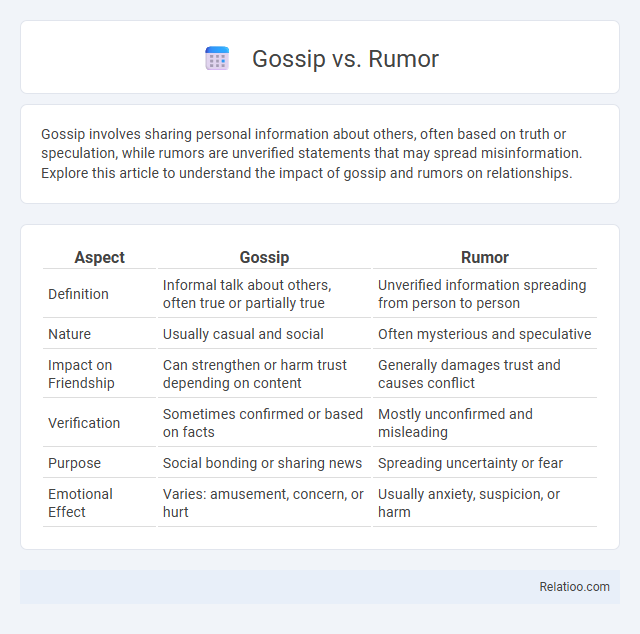Gossip involves sharing personal information about others, often based on truth or speculation, while rumors are unverified statements that may spread misinformation. Explore this article to understand the impact of gossip and rumors on relationships.
Table of Comparison
| Aspect | Gossip | Rumor |
|---|---|---|
| Definition | Informal talk about others, often true or partially true | Unverified information spreading from person to person |
| Nature | Usually casual and social | Often mysterious and speculative |
| Impact on Friendship | Can strengthen or harm trust depending on content | Generally damages trust and causes conflict |
| Verification | Sometimes confirmed or based on facts | Mostly unconfirmed and misleading |
| Purpose | Social bonding or sharing news | Spreading uncertainty or fear |
| Emotional Effect | Varies: amusement, concern, or hurt | Usually anxiety, suspicion, or harm |
Understanding Gossip and Rumor: Key Differences
Gossip involves sharing personal or sensational information about others, often based on truth but exaggerated, whereas rumors are unverified claims or stories that spread widely and may be true or false. Understanding these key differences helps you discern whether the information is grounded in reality or speculation, impacting how you respond and share it. Both gossip and rumors can influence social dynamics, but recognizing their nature promotes more responsible communication.
The Origins of Gossip and Rumor
Gossip originates from informal social communication, often shared within small communities to exchange personal or private information about others, shaping social bonds and group dynamics. Rumors arise from unverified or speculative information, spreading quickly through various channels and frequently causing misinformation or fear within larger audiences. Understanding the origins of gossip and rumor helps you recognize their role in communication, social influence, and the potential impact on relationships.
Psychological Motivations Behind Gossip and Rumor
Gossip and rumor both stem from deep psychological motivations such as the human need for social bonding, information gathering, and enhancing one's social standing. Gossip often serves to reinforce group identity and trust by sharing personal details about others, while rumors typically arise from uncertainty and fear, spreading unverified information to make sense of ambiguous situations. Understanding these motivations can help you navigate social interactions more effectively and recognize the impact of gossip and rumor on group dynamics.
How Gossip Spreads vs. How Rumors Spread
Gossip typically spreads through casual conversations among people who share a social or community connection, relying on personal interactions and word-of-mouth communication. Rumors, in contrast, often travel faster and wider by exploiting uncertainty and curiosity, spreading through various channels including social media and public forums where facts are not verified. Your understanding of these differences can help you navigate and manage information more effectively in both personal and professional settings.
Social Impacts of Gossip Compared to Rumor
Gossip often involves informal, personal conversations that can strengthen social bonds and community ties, whereas rumors typically spread unverified information causing widespread misinformation and social anxiety. The social impacts of gossip include increased group cohesion and trust when shared appropriately, while rumors frequently lead to fear, stigma, and conflict within communities. Understanding the distinct social effects helps in managing communication dynamics and mitigating negative consequences in social environments.
Gossip in the Workplace vs. Rumor in Organizations
Gossip in the workplace often involves informal, personal information exchanged among employees that can impact morale and relationships, whereas rumors within organizations typically relate to unverified, wide-reaching information affecting broader organizational perceptions and decision-making. Workplace gossip centers on social connections and can either build camaraderie or cause division, while rumors tend to create uncertainty and disrupt trust across departments. Understanding the distinction helps organizations implement targeted communication strategies to maintain a positive, transparent work environment.
Effects on Relationships: Gossip vs. Rumor
Gossip often involves sharing personal information that can build social bonds but may also lead to misunderstandings and hurt feelings, impacting your trust with others. Rumors, by contrast, typically spread unverified or false information that can severely damage reputations and erode relationships quickly. Understanding the distinction helps you navigate social dynamics and protect your interpersonal connections from harm.
Recognizing Harmful Gossip and Dangerous Rumors
Recognizing harmful gossip involves identifying false or malicious statements that damage reputations and create mistrust within communities or workplaces. Dangerous rumors often spread misinformation that incites panic, fear, or social division, making critical evaluation of sources and motives essential. Both gossip and rumors require discernment to prevent the escalation of conflict and protect mental well-being and social harmony.
Strategies to Address and Prevent Gossip and Rumor
Addressing and preventing gossip and rumors in the workplace requires clear communication policies and fostering an environment of trust and transparency. Your organization can implement confidential reporting channels and regular training sessions to educate employees about the negative impacts of gossip and rumors on team dynamics and productivity. Encouraging open dialogue and promoting positive interactions reduces misinformation and supports a healthy organizational culture.
Gossip vs. Rumor: Which Is More Harmful?
Gossip involves sharing personal or sensational information about others, often based on true events but exaggerated, while rumors are unverified claims that spread without confirmation, fueling uncertainty and fear. Rumors tend to be more harmful because they can distort reality, incite misinformation, and damage reputations on a larger, more uncontrolled scale. Understanding the nuances between gossip and rumor helps mitigate their negative social impacts by promoting critical evaluation before sharing information.

Infographic: Gossip vs Rumor
 relatioo.com
relatioo.com